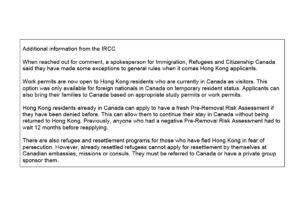Canada welcomes Hong Kong residents fleeing crackdown
By Ravishan Wijemanne and Jeff Crowley

Andrew Work is a Canadian living in Hong Kong and the CEO of New Work Media. Photo by Chris Lusher
The federal government has opened a faster pathway for Hong Kong residents to come to Canada.
Minister of Immigration, Refugees and Citizenship Marco Mendicino said Hong Kong residents will be eligible for three-year open work permits starting Feb. 8. Hong Kong residents who have one year of Canadian work experience or a post-secondary education qualification from a Canadian institution will also be eligible for a faster pathway to gain Canadian permanent residence.
The program is part of Canada’s response to Hong Kong denying consular protection to Canadian dual nationals. Hong Kong Chief Executive Carrie Lam said her government has not recognized dual citizenship since Britain handed over Hong Kong to China in 1997.
Christelle Chartrand, a spokesperson for Global Affairs Canada, said the law may be enforced against detainees who declare themselves as Chinese nationals.
“Global Affairs Canada received a first indication of a Canada dual-national prisoner in Hong Kong being required to make such a declaration on Jan. 18, 2021,” said Chartrand. “Canadians who wish to receive consular services should present themselves as Canadian to authorities at all times.”
Andrew Work, chief executive officer of New Work Media, a publishing company based in Hong Kong, said residents with ties to Canada are concerned whether the announcement applies to them.
“It is a very Hong Kong situation,” said Work. “If you want to emigrate out of China…you have to formally renounce your Chinese citizenship. Whereas in Hong Kong people never did that. There is a lot of Canadians here, whether they are Chinese Canadians or one of the parents is a Chinese Canadian…they are like, do I get considered a Chinese citizen? They just don’t know.”
An alumnus of the University of Victoria, the 48-year-old Work moved from Canada to Hong Kong in 1996, following his girlfriend.
People who have stayed in Hong Kong for more than seven years are eligible for permanent residency, which gives them the right to vote. According to a survey conducted by Asia Pacific Foundation in 2011, there are about 300,000 Canadians living in Hong Kong.
On June 30 of last year, the government of Hong Kong passed a law which gives authorities the power to arrest anyone considered a threat to national security and to prevent them from leaving Hong Kong. The law also gives authorities power to take away a detainee’s passport and to freeze his or her bank accounts.
The Hong Kong law followed a decision passed by the government of China on May 28, intending to crackdown on “advocacy for ‘Hong Kong independence’, secession, violence and terrorism.” According to the joint declaration signed by the governments of Britain and China in 1997, Hong Kong is governed by China under the “one country, two systems” principle.
Ryan Hui, a 22-year-old Windsorite, is a second-generation immigrant from Hong Kong. Since moving to Canada in the late 1990s, Hui’s family has made frequent visits to Hong Kong, which he considers his second home.
“With the instability happening now in Hong Kong, they finally agreed to move,” said Hui. “When I was on vacation there were active movements every day. I couldn’t go a day without seeing people start protests.”
Hui said his family is planning to enter Canada with work permits and to apply for citizenship thereafter.
A report by the Taiwan Mainland Affairs Council shows more than 10,000 Hong Kong residents emigrated to Taiwan in 2020, about twice as many as 2019.
“They just want to stop who they consider troublemakers from being active,” said Work. “If you are just quietly going to go, that’s fine. But if you are getting into trouble with the authorities, those are measures they can take.”

This story was updated with a photo of Andrew Work by Chris Lusher, on March 5, 2021.


